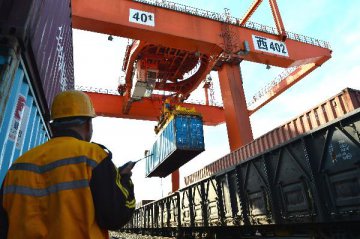
Although European Commission President Jean-Claude Juncker on Wednesday voiced his confidence towards the Italian government, saying the country was "heading in the right direction," analysts here believe reforms are still necessary for the country after years of economic malaise.
Juncker's remarks came just four months after the defeat of a national referendum on a constitutional reform championed by former Italian prime minister Matteo Renzi.
The defeat also forced the stepdown of Renzi and bolstered euro-skeptic forces in the country.
But in an interview with the Italian newspaper La Repubblica on Wednesday, Juncker said there was no fear that Italy may head towards economic trouble or it may vote to leave the 19-nation euro zone as some Italian euro-skeptic groups are calling for.
"The commitment of the Italian government is going in the right direction," Juncker said. "In the meantime, let me clearly rule out the possibility that Italy will leave the euro."
Juncker also supported the efforts of the government of Paolo Gentiloni, the former foreign minister who took over as head of government after Renzi resigned, to tackle banking sector problems. Juncker predicted Italian banks would emerge from the crisis "stronger and more robust."
Economists, who spoke to Xinhua, say although they do not think Juncker's optimism for Italy was misplaced, the country still has a lot of work to do.
"There are no big changes going on in Italy right now, but the political situation is more stable under Gentiloni and the economy is looking better," said Carlo Altomonte, a political economy professor with Bocconi University in Milan, in an interview.
"To a certain point, Juncker was saying what he is supposed to say, he is sending the right signals," the professor said.
Francesco Daveri, a public finance expert with Italy's Sacro Cuore University, holds a similar point of view. "The situation in Italy right now is about as good as one can hope for, with the return of economic growth of about 1 percent per year," Daveri told Xinhua.
"But corporate taxes are still too high and the economy is still weighted down by too many regulations. These areas will eventually have to be reformed," cautioned the expert.
But many analysts do not foresee tangible reforms quite likely before an elected prime minister and a strong government.
ABS Securities political affairs analyst Gian Franco Gallo says the next Italian government will determine whether Juncker's confidence is warranted.
"If the next government managers to form a strong coalition then it will have a mandate to take on some of the difficult reforms the country needs," Gallo said in an interview.
"If it is a weak coalition or a coalition involving a euro-skeptic party, then I think this optimism may be short lived," the analyst added.
The current Italian parliament expires on March 15, 2018. And a general election will happen no later than 70 days after the expiration.























Latest comments